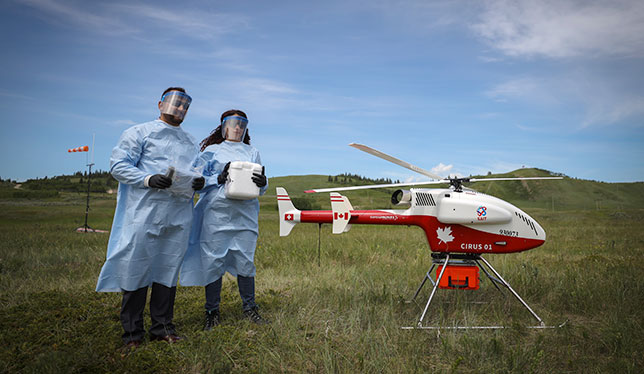A team of professionals from the University of Calgary, the Southern Alberta Institute of Technology and the Stoney Nakoda Nation have been testing the use of drones into help remote communities cope with the COVID-19 pandemic. The project uses drones to deliver supplies like COVID-19 testing kits and personal protective equipment to the Morley, Bighorn and Eden Valley, the three Indigenous communities that comprise the Stoney Nakoda Nation.
The project came out of a chance meeting between John Conly, medical director of the W21C Research and Innovation Centre at the university’s Cumming School of Medicine, and SAIT researcher Wade Hawkins in 2019. The two shared a mutual interest in how drones, or unmanned aerial vehicles, can be used for health-care administration in hard-to-access locations. That conversation would prove crucial come spring 2020, and in June, with approval by the Stoney Nakoda Nation council, their drone project was underway.

Aaron Khan, executive director and CEO of Stoney Health Services and Bighorn Health Services, says the project has revealed the great potential that drones have for their communities post-pandemic. He says Stoney Nakoda Nation leadership has been meeting with the research team to discuss training members of the First Nation, particularly youth, to operate the drones themselves.
“We’re trying to come up with a comprehensive plan, because this is a technology of the future,” Mr. Khan says. One option could be to offer courses in the community that would count towards a pilot license or related diploma. “Our youth are pretty good with technology,” Mr. Khan says, “so we want to be proactive.”
Typically, emergency medical supplies, including COVID-19 necessities, have been delivered by ground transportation, which can be vulnerable to poor road conditions or traffic disturbances. Mr. Khan says the research has also brought on ideas for remotely delivered health care beyond COVID-19, including the delivery of life saving medications, or the remote operation of ultrasound machines or defibrillators.
“The sky’s the limit with this technology,” he says.